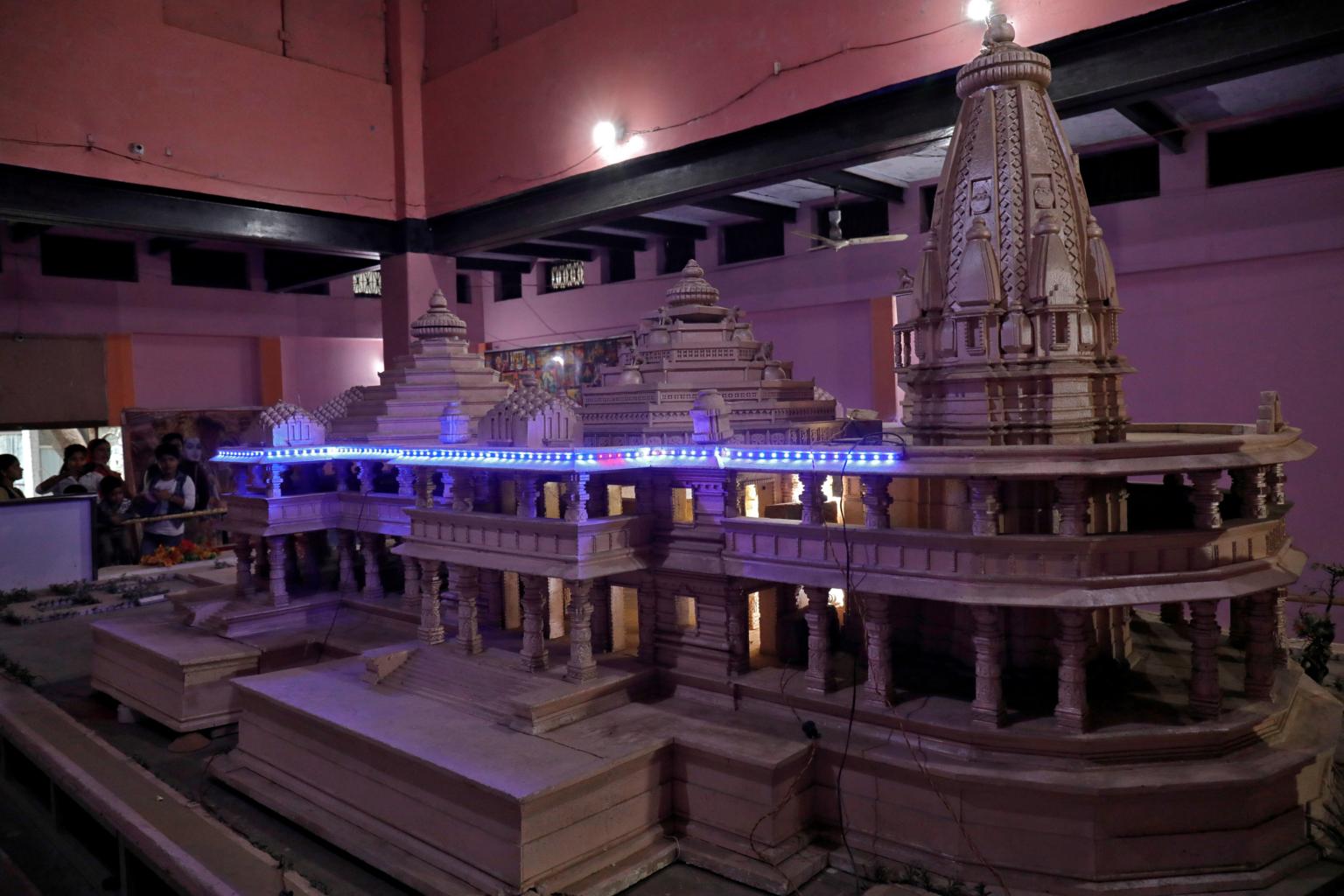Supreme Court hearing ends over Ayodhya land dispute in India, verdict expected in November
Sign up now: Get ST's newsletters delivered to your inbox

People look at a model of a proposed temple that Hindu groups want to build at a disputed religious site in Ayodhya in Uttar Pradesh, India, on Nov 9, 2018.
PHOTO: REUTERS
Follow topic:
NEW DELHI - Hearings in one of India's most protracted legal disputes over the ownership of a patch of land in Ayodhya that is fiercely contested between Muslims and Hindus drew to a close on Wednesday (Oct 16).
The Supreme Court is expected to pronounce its judgment on a dispute that first entered court in 1885, a decision that is bound to have far-reaching political as well as social repercussions in India.
The land in question is a 1.12ha plot on which stood the 16th-century Babri mosque that was razed on Dec 6, 1992 by right-wing Hindu activists. Many Hindus claim the site is the birthplace of their deity, Lord Ram, and that the mosque was built on the ruins of an ancient temple there. The mosque's demolition sparked riots across the country, leaving around 2,000 people dead. Nearly three decades on, the incident remains a sensitive issue and continues to bedevil Hindu-Muslim relations.
Prohibitory orders banning the assembly of four or more persons were issued by the local administration in Ayodhya ahead of the verdict on the Ayodhya land dispute. They came into effect on Oct 12 and will be applicable till Dec 10.
The top court has taken up as many as 14 appeals against a September 2010 verdict of the Allahabad High Court that had awarded two-thirds of the disputed land to two Hindu entities - the young infant Lord Ram, represented by some of his devotees, and the Nirmohi Akhara sect. The remaining third was awarded to a Muslim group - the Uttar Pradesh Sunni Central Waqf Board. The Supreme Court has been hearing the case on a daily basis since August; Wednesday was the 40th day of the hearing.
The hearings have been charged with contesting parties drawing on faith as well as tradition to stake their claim to ownership of the land. Describing the political import of the case, Mr Nilanjan Mukhopadhyay, a political commentator and author of a book on the dispute, said its outcome would result in further Hindu polarisation in favour of the Bharatiya Janata Party (BJP) and the Rashtriya Swayamsevak Sangh, a right-wing Hindu socio-political organisation with close ties to the BJP.
"It is a heads-I-win, tails-you-lose scenario for the BJP and for the government," he told The Straits Times. "If the Hindus don't get the land, they will be angry. If they do and a temple comes up, they will be euphoric. And there is only one party which can milk either joy or anger of the Hindus as a political constituency - it is the BJP," he added. A decision against Hindus, Mr Mukhopadhyay said, could even lead the government to potentially explore a legislative route to hand over the site to some Hindu groups.
Constructing a Ram temple at the disputed site in Ayodhya was part of the BJP's election manifesto for the 2019 as well as the 2014 General Election. Together with the abrogation of Article 370 in Jammu and Kashmir, which was carried out in August, and the introduction of a Uniform Civil Code, these three issues form the BJP's core offerings to please its Hindu vote bank.
The last day of arguments in the Supreme Court witnessed an unexpected turn with the Uttar Pradesh Sunni Central Waqf Board reportedly offering to withdraw its claim over the disputed site as part of a parallel court-appointed mediation effort in return for some guarantees. The proceedings of the mediation panel are confidential but the board's advocate Shahid Razvi told reporters on Thursday that a "win-win settlement" had been reached. However, a statement released by an advocate for another Muslim litigant - there are six other Muslim parties to this dispute - said the board had "no more locus than any other individual Muslim parties" on this case and that the stand of the board "will have no consequence".
Regardless of the position of individual stakeholders, Mr Mukhopadhyay said the Supreme Court still has to decide on the ownership title suit.
"Whatever is the verdict, they should decide whose land it is and give it to them. If in our country, where we are still a functional democracy, if a civil matter cannot be decided on the basis of law and on the basis of custodianship and extraneous circumstances come in - whether it is faith or tradition - then I think it is a tragedy."

